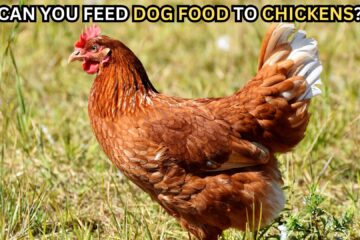A balanced diet is fundamental to the health and well-being of dogs, just as it is for humans. It ensures that they receive the essential nutrients needed for optimal growth, repair, and function of their bodies.
Nutritional balance in a dog’s diet affects everything from their energy levels and coat quality to their overall longevity and susceptibility to diseases.
However, nutritional imbalances are a common issue among canines, often due to well-intentioned but misinformed choices made by their owners.
The consequences of such imbalances can range from minor health issues to serious, life-threatening conditions.
Recognizing and addressing these imbalances early can prevent long-term health problems and improve the quality of life for our furry friends.
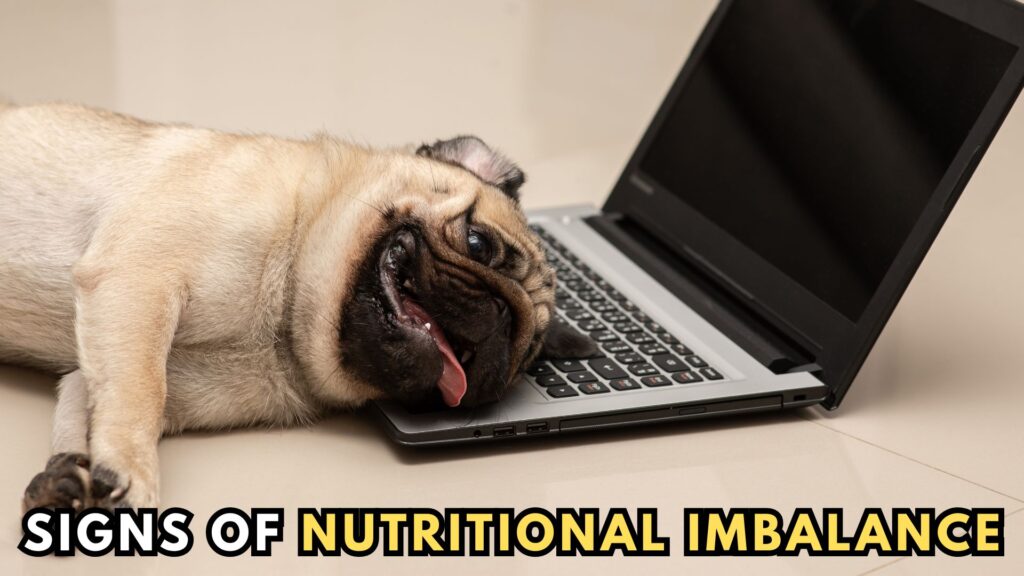
The purpose of this blog post is to educate dog owners on the signs of nutritional imbalances in dogs, understand what causes these imbalances, and learn how to correct them.
By providing this information, we aim to help owners make informed decisions about their dog’s diet and overall care.
Understanding Nutritional Imbalance in Dogs
What is Nutritional Imbalance?
A nutritional imbalance occurs when a dog’s diet either lacks or exceeds the essential nutrients required for a healthy life.
These imbalances can be categorized into two types: deficiencies and excesses. Deficiencies arise when the diet does not provide enough vitamins, minerals, proteins, fats, or carbohydrates.
Excesses occur when one or more nutrients are over-supplied, which can be just as harmful as deficiencies.
Causes of Nutritional Imbalance in Dogs
Nutritional imbalances can stem from various causes, including:
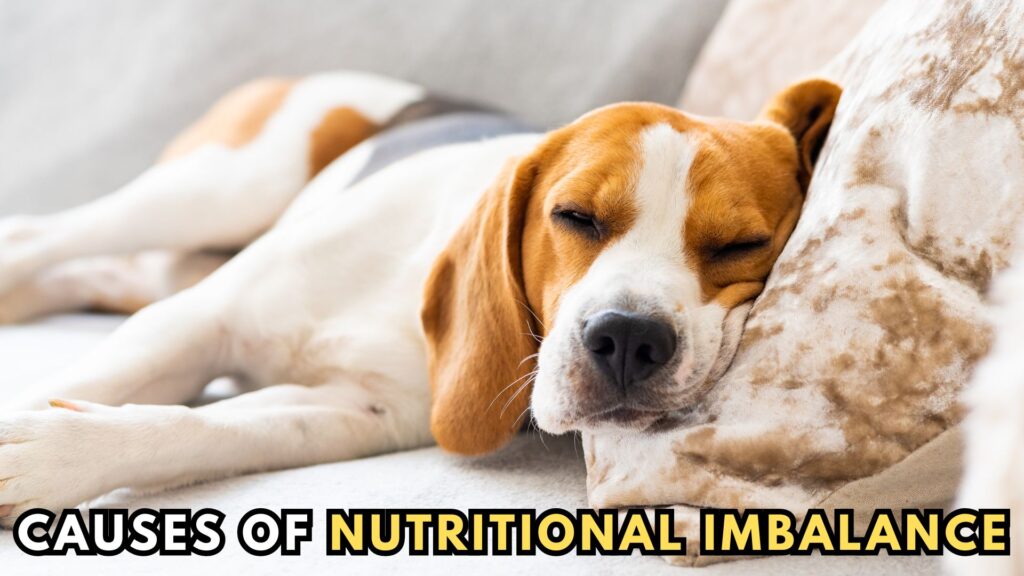
Common Dietary Mistakes:
Misunderstanding a dog’s nutritional needs can lead to improper food choices. For example, feeding dogs a human diet or low-quality commercial dog food may not meet their specific nutritional requirements.
Breed, Age, and Health Conditions:
Different breeds, ages, and health statuses demand different nutritional needs. Large breeds have different needs compared to small breeds, puppies require different nutrients compared to adult dogs, and dogs with health conditions may require special diets.
Recognizing the Signs of Nutritional Imbalance
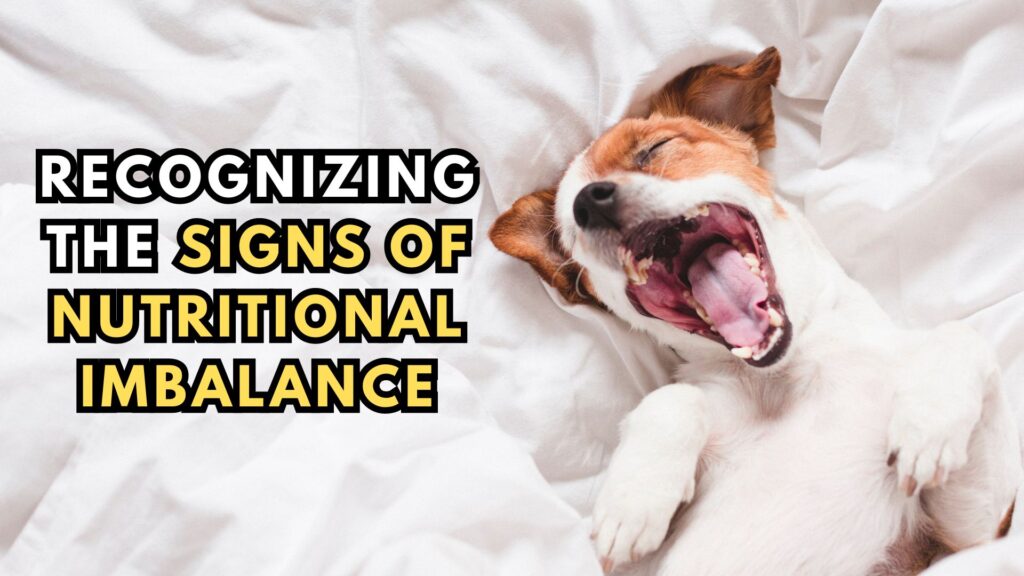
Physical Indicators of Nutritional Deficiencies
Several physical signs can indicate a nutritional imbalance:
- Coat and Skin Health: A lack of essential fatty acids, vitamins, or minerals can lead to a dull coat, excessive shedding, or skin issues.
- Weight Changes: Unexplained weight gain or loss can signal an imbalance. Obesity can result from excess calories, while weight loss can indicate a deficiency in calories or essential nutrients.
- Dental Problems: Poor nutrition can contribute to dental issues, including gum disease and tooth decay.
Behavioral Signs of Nutritional Issues
Nutritional imbalances can also affect a dog’s behavior:
- Changes in Appetite: A sudden increase or decrease in appetite can be a sign of an imbalance.
- Energy Levels and Behavior: Nutritional deficiencies can lead to lethargy or hyperactivity, while excesses might cause sluggishness.
Long-Term Health Implications
Ongoing nutritional imbalances can severely impact a dog’s health over time:
- Overall Health and Longevity: Chronic deficiencies or excesses can lead to diseases such as diabetes, heart disease, and arthritis, potentially reducing a dog’s lifespan.
- Susceptibility to Diseases: An imbalanced diet can weaken a dog’s immune system, making them more susceptible to infections and diseases.
By understanding and recognizing the signs of nutritional imbalances, dog owners can take proactive steps to ensure their pets receive a balanced diet that meets their specific needs.
This not only helps in preventing immediate health issues but also contributes to the long-term well-being and happiness of their canine companions.
Preventing and Addressing Nutritional Imbalance
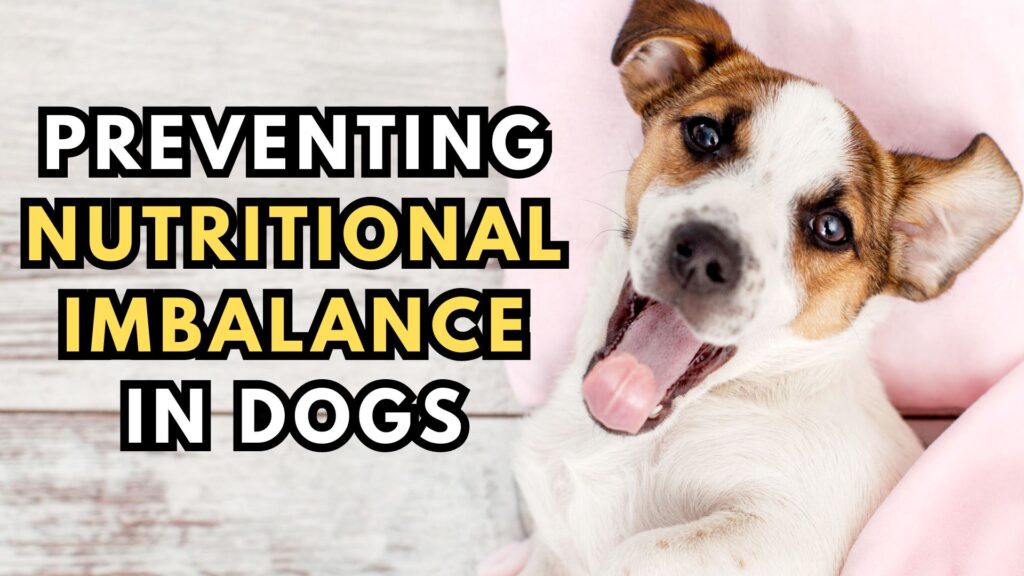
Essential Nutrients for a Balanced Canine Diet
A balanced diet for dogs should include a mix of essential nutrients to support their overall health and energy levels. These nutrients include:
- Proteins: The building blocks of muscles, organs, and skin. High-quality animal proteins from meat, fish, and eggs provide essential amino acids.
- Fats: Essential for energy, fat-soluble vitamin absorption, and healthy skin and coat. Sources include animal fats and oils from plants.
- Carbohydrates: Provide energy and help with digestion. Good sources are vegetables, grains, and fruits.
- Vitamins and Minerals: Crucial for metabolic functions, bone health, and disease prevention. Must be balanced correctly to avoid deficiencies or toxicities.
- Water: Essential for hydration, digestion, and nutrient transport.
Evaluating and Choosing the Right Dog Food
Choosing the right dog food involves several considerations to ensure it meets your dog’s nutritional needs:
- Read Labels Carefully: Look for foods that list a high-quality protein source as the first ingredient. Avoid foods with excessive fillers, artificial colors, or preservatives.
- Understand Ingredient Quality: Higher quality ingredients are more digestible and provide more nutrients. Research brands and seek foods that use whole foods and named meat sources.
- Check for AAFCO Statements: Ensure the dog food meets the nutritional standards set by the Association of American Feed Control Officials (AAFCO).
When to Consult a Veterinarian
Veterinary guidance is crucial when:
- Adjusting Diets: If you’re considering changing your dog’s diet due to health issues or nutritional imbalances.
- Health Monitoring: Regular check-ups can help catch nutritional imbalances early.
- Specialized Diets: Dogs with health conditions may require specific dietary adjustments.
Implementing a Balanced Diet Plan

Tailoring Nutrition to Your Dog’s Needs
A balanced diet plan must consider:
- Breed: Different breeds may have specific nutritional needs.
- Size and Age: Dietary requirements vary significantly between puppies, adult dogs, and seniors.
- Activity Level: Active dogs have higher energy requirements.
Supplementing Your Dog’s Diet
While most commercial dog foods are formulated to be nutritionally complete, some dogs may benefit from supplements:
- Fish Oil: For omega-3 fatty acids to support coat and skin health.
- Probiotics: To aid digestion and gut health.
- Glucosamine: For joint health, especially in older dogs.
Always consult with a veterinarian before adding supplements to your dog’s diet.
Homemade Diets and Raw Feeding
Homemade and raw diets can offer fresh, whole-food options for dogs, but require careful planning to ensure nutritional balance:
- Professional Guidance: Consult a veterinary nutritionist to develop a balanced diet plan.
- Balanced Recipes: Ensure homemade diets include the right mix of proteins, fats, carbohydrates, vitamins, and minerals.
Conclusion
Recognizing and addressing nutritional imbalances is crucial for maintaining a dog’s health and well-being. A balanced diet tailored to an individual dog’s needs can prevent health issues and promote a long, healthy life.
Responsible pet ownership involves making informed dietary choices and seeking professional advice when necessary.
By understanding the essentials of canine nutrition and the importance of a balanced diet, dog owners can ensure their furry companions thrive.
FAQs
What are the first signs of nutritional imbalance in a dog?
The first signs of nutritional imbalance in a dog can vary but often include physical and behavioral changes.
Physical signs may involve alterations in coat and skin health, such as a dull coat, excessive shedding, or dry and itchy skin.
Weight changes are also common, with dogs either gaining or losing weight without a change in their diet or exercise routine.
Behavioral signs include variations in appetite (either increased or decreased), lethargy, or unusual hyperactivity.
Early detection of these signs is crucial for addressing nutritional imbalances effectively.
Can a nutritional imbalance be reversed?
Yes, most nutritional imbalances can be reversed, especially if they are detected early and addressed properly. Reversing a nutritional imbalance typically involves adjusting the dog’s diet to ensure it includes the right balance of nutrients.
This might mean switching to a higher-quality dog food, incorporating specific supplements, or adjusting the portions of current food.
In some cases, especially if the imbalance has led to health issues, veterinary intervention may be required to guide the diet adjustment and monitor the dog’s recovery.
How often should I reassess my dog’s dietary needs?
It’s recommended to reassess your dog’s dietary needs at least once a year or whenever there’s a significant change in their life or health status.
Significant changes can include alterations in activity level, weight changes, aging, or the diagnosis of health conditions.
Puppies and senior dogs may require more frequent reassessments due to their changing nutritional needs as they grow and age.
Are certain breeds more prone to nutritional imbalances?
Yes, certain breeds may be more prone to nutritional imbalances due to specific genetic predispositions, size, energy levels, and health issues.
For example, large breeds like Great Danes or Labrador Retrievers may be at higher risk for joint issues and may benefit from diets that support joint health.
Small breeds may have faster metabolisms and might require diets higher in calories and nutrients per pound of body weight.
Additionally, breeds with specific health issues, such as Bulldogs with skin conditions, may require special dietary considerations to prevent imbalances.
What is the role of supplements in correcting nutritional imbalances?
Supplements can play a significant role in correcting nutritional imbalances by providing targeted nutrients that may be lacking in the dog’s diet.
For example, omega-3 fatty acid supplements can improve coat and skin health, probiotics can aid in digestion and gut health, and glucosamine supplements can support joint health.
However, it’s important to use supplements wisely and under the guidance of a veterinarian, as unnecessary supplementation can lead to an excess of certain nutrients and create new imbalances. Supplements should complement a well-balanced diet, not replace it.


